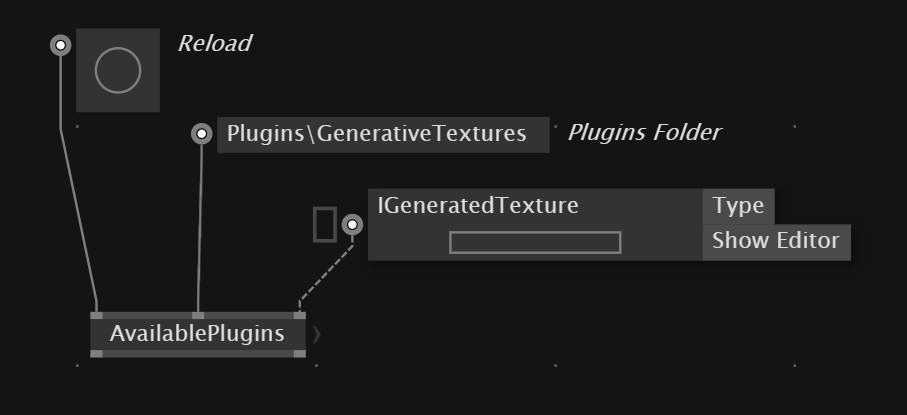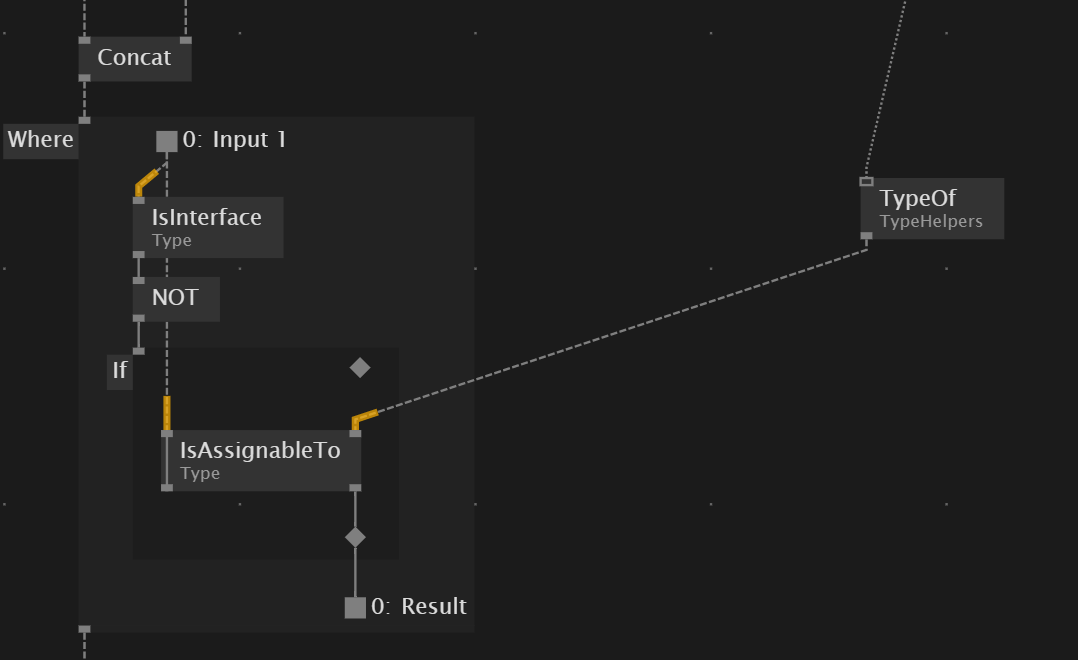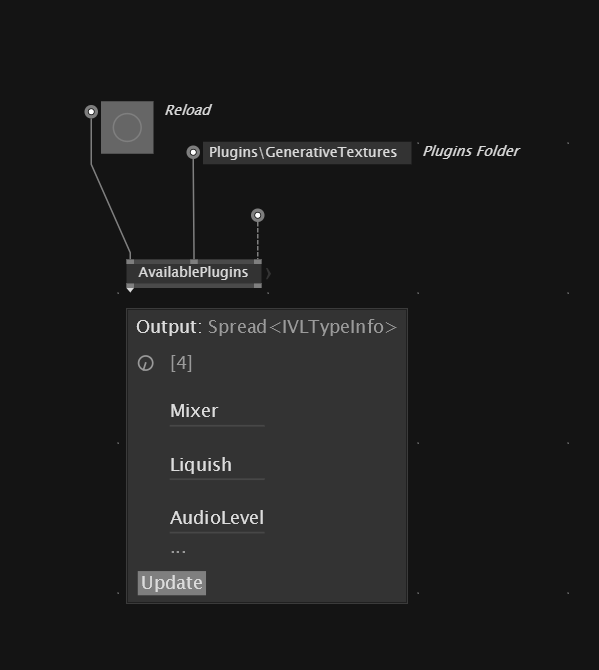I’ve tried to replicate this in our project, but I couldn’t get it to work. Is it possible to use this without exporting the host?
On scanning the DLLs there is an error that is a bit weird because it seems to try to look for a VL document when scanning for types in the DLL:
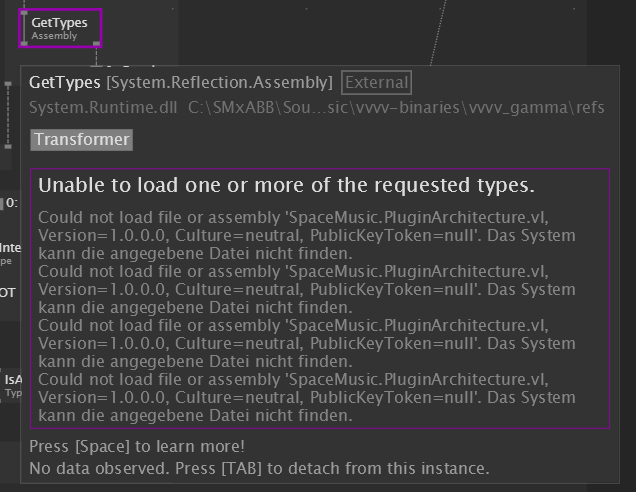
SpaceMusic.PluginArchitecture.vl would be the interfaces.vl in your example.
I’ve copied these files into the plugins folder next to the main VL document:
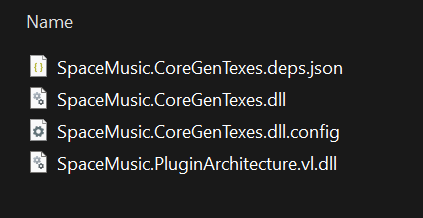
Without the SpaceMusic.PluginArchitecture.vl.dll the same error occurs.
The main document references the SpaceMusic.PluginArchitecture.vl, the plugin architecture file also contains the nodes to scan and load plugins, could that be an issue?
EDIT:
just tried this in your example and it seems to have the same problem:
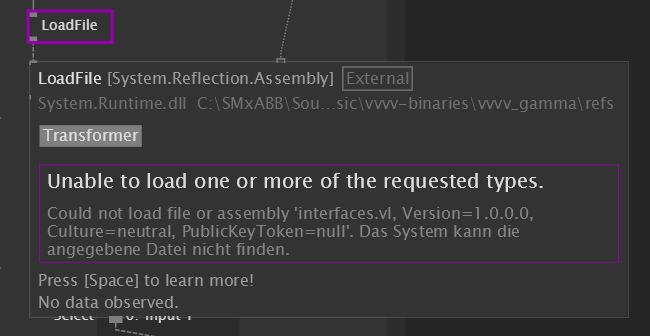
EDIT2:
I’ve tried to load the DLL of the interfaces.vl file instead of referencing the vl document, but loading it creates this error and vvvv doesn’t do anything anymore:
Exception
NullReferenceException: "Object reference not set to an instance of an object."
StackTrace:
VL.Lang.Platforms.Roslyn.AssemblySymbolSource+<>c__DisplayClass10_0 { internal VL.Lang.Platforms.Roslyn.CompiledSymbols <.ctor>b__1() { ... } }
System.Lazy`1 { private void ViaFactory(System.Threading.LazyThreadSafetyMode mode) { ... } }
System.Runtime.ExceptionServices.ExceptionDispatchInfo { public void Throw() { ... } }
System.Lazy`1 { private T CreateValue() { ... } }
VL.Lang.Platforms.Roslyn.AssemblySymbolSource { internal VL.Lang.Platforms.Roslyn.CompiledSymbols get_CompiledSymbols() { ... } }
VL.Lang.Platforms.Roslyn.SymbolSourceProvider { public virtual VL.Lang.Symbols.ISymbolSource GetSymbolSource(string location) { ... } }
VL.Lang.Symbols.DocSymbols+DependencySymbol+<GetReferencesCore>d__29 { private virtual bool MoveNext() { ... } }
System.Collections.Generic.LargeArrayBuilder`1 { public void AddRange(System.Collections.Generic.IEnumerable<> items) { ... } }
System.Collections.Generic.EnumerableHelpers { internal static T[] ToArray(System.Collections.Generic.IEnumerable<> source) { ... } }
System.Collections.Immutable.ImmutableArray { public static System.Collections.Immutable.ImmutableArray<> CreateRange(System.Collections.Generic.IEnumerable<> items) { ... } }
VL.Model.InterlockedHelper { public static System.Collections.Immutable.ImmutableArray<> Init(System.Collections.Immutable.ImmutableArray<>& this, System.Collections.Generic.IEnumerable<> values) { ... } }
VL.Lang.Symbols.DocSymbols+DependencySymbol { public virtual System.Collections.Immutable.ImmutableArray<VL.Lang.Symbols.ISymbolSource> get_References() { ... } }
VL.Lang.Symbols.PreCompilation { internal VL.Lang.Helper.Graph<uint, VL.Lang.Symbols.DocSymbols> BuildDocumentGraph(bool skipPreCompiled, bool introduceBackedges) { ... } }
VL.Lang.Symbols.PreCompilation+<>c__DisplayClass19_0 { internal System.Collections.Generic.IEnumerable<VL.Lang.Symbols.IProjectSymbol> <Initialize>g__CreateAdhocProjects|14() { ... } }
VL.Lang.Symbols.PreCompilation { private void Initialize(VL.Lang.Symbols.PreCompilation previousCompilation, System.Threading.CancellationToken token, System.IProgress<VL.Model.LoadMessage> progress) { ... } }
VL.Lang.Symbols.PreCompilation { internal static VL.Lang.Symbols.PreCompilation Create(VL.Lang.Symbols.IPlatform platform, VL.Model.Internal.Solution solution, VL.Lang.Symbols.PreCompilation previous, VL.Model.CompileOptions options, System.Threading.CancellationToken token, System.IProgress<VL.Model.LoadMessage> progress) { ... } }
VL.Lang.Symbols.PreCompilation { internal VL.Lang.Symbols.PreCompilation WithSolution(VL.Model.Internal.Solution value, VL.Model.CompileOptions options, System.Threading.CancellationToken token, System.IProgress<VL.Model.LoadMessage> progress) { ... } }
VL.Lang.Symbols.PreCompilation { public VL.Lang.Symbols.PreCompilation WithSolution(VL.Model.Solution value, VL.Model.CompileOptions options, System.Threading.CancellationToken token, System.IProgress<VL.Model.LoadMessage> progress) { ... } }
VL.Model.VLSession+<>c__DisplayClass194_0 { internal VL.Lang.Symbols.PreCompilation <PrepareSolutionWithFreshSymbolsAsync>b__0() { ... } }
System.Threading.Tasks.Task`1 { internal virtual void InnerInvoke() { ... } }
System.Threading.Tasks.Task+<>c { internal void <.cctor>b__272_0(object obj) { ... } }
System.Threading.ExecutionContext { internal static void RunFromThreadPoolDispatchLoop(System.Threading.Thread threadPoolThread, System.Threading.ExecutionContext executionContext, System.Threading.ContextCallback callback, object state) { ... } }
System.Runtime.ExceptionServices.ExceptionDispatchInfo { public void Throw() { ... } }
System.Threading.ExecutionContext { internal static void RunFromThreadPoolDispatchLoop(System.Threading.Thread threadPoolThread, System.Threading.ExecutionContext executionContext, System.Threading.ContextCallback callback, object state) { ... } }
System.Threading.Tasks.Task { private void ExecuteWithThreadLocal(System.Threading.Tasks.Task& currentTaskSlot, System.Threading.Thread threadPoolThread) { ... } }
System.Runtime.ExceptionServices.ExceptionDispatchInfo { public void Throw() { ... } }
System.Runtime.CompilerServices.TaskAwaiter { private static void ThrowForNonSuccess(System.Threading.Tasks.Task task) { ... } }
System.Runtime.CompilerServices.TaskAwaiter { private static void HandleNonSuccessAndDebuggerNotification(System.Threading.Tasks.Task task) { ... } }
System.Runtime.CompilerServices.TaskAwaiter`1 { public TResult GetResult() { ... } }
VL.Model.VLSession+<PrepareSolutionWithFreshSymbolsAsync>d__194 { private virtual void MoveNext() { ... } }
System.Runtime.ExceptionServices.ExceptionDispatchInfo { public void Throw() { ... } }
System.Runtime.CompilerServices.TaskAwaiter { private static void ThrowForNonSuccess(System.Threading.Tasks.Task task) { ... } }
System.Runtime.CompilerServices.TaskAwaiter { private static void HandleNonSuccessAndDebuggerNotification(System.Threading.Tasks.Task task) { ... } }
System.Runtime.CompilerServices.TaskAwaiter`1 { public TResult GetResult() { ... } }
VL.Model.VLSession+<UpdateCompilationAsync>d__192 { private virtual void MoveNext() { ... } }




